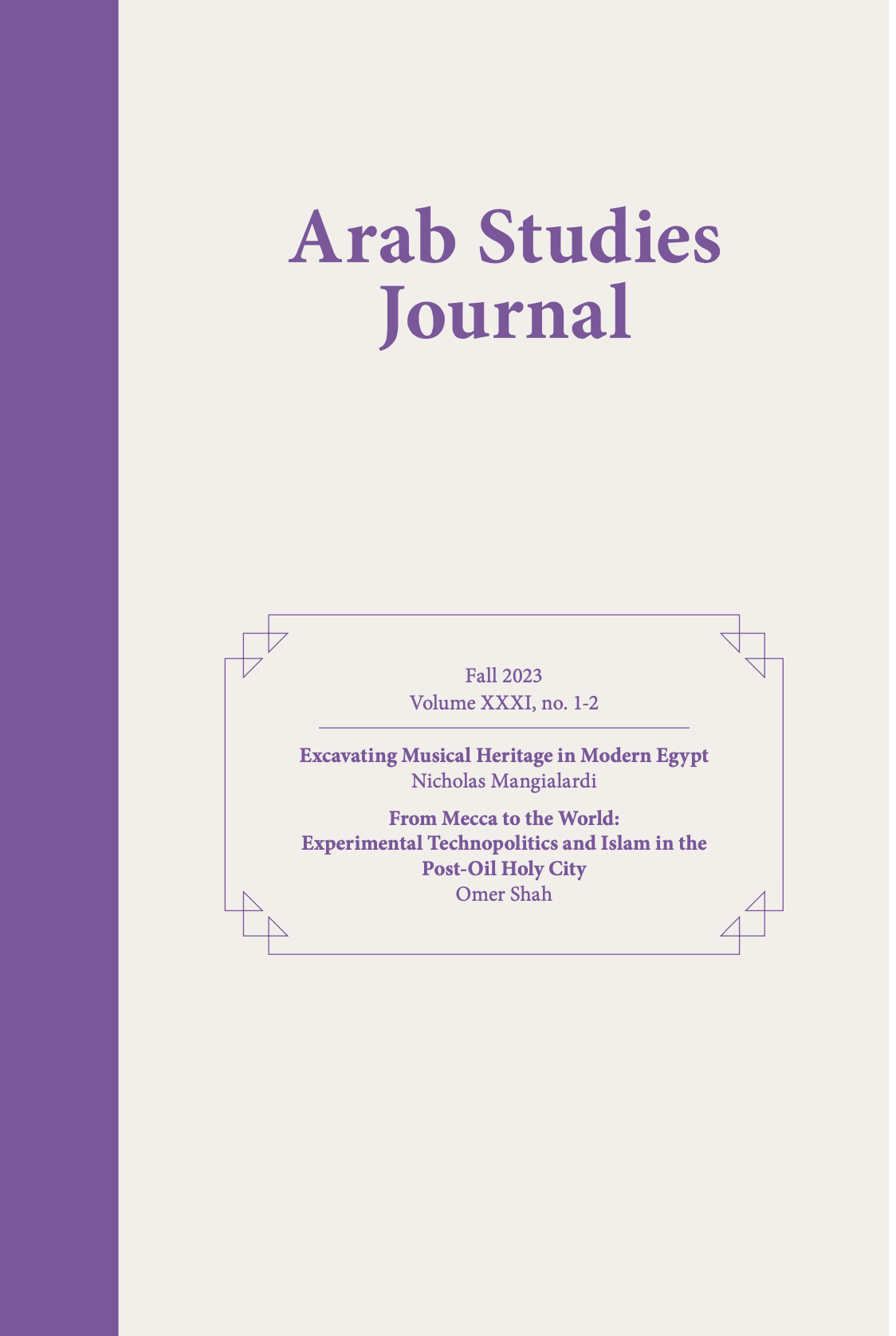[This is the Editor's Note and Table of Context for the Arab Studies Journal Fall 2023 issue, which is now available for purchase. Click here to subscribe to Arab Studies Journal.]
Arab Studies Journal
Vol. XXXI, No. 1-2
Fall 2023
This issue presents significant interventions in our understanding of relationships between heritage and technology. In our articles section, we are proud to feature Nicholas Mangialardi’s exploration of how Egyptian effendiyya framed Egyptian music as an endangered national heritage. Mangialardi reveals how effendiyya maintained their status as arbiters of Egyptian modernity through their efforts to “preserve” this national heritage. Omer Shah contributes an original interrogation of the technopolitical institution-building that undergirds the much-touted Saudi development program known as Vision 2030. Shah's article is an ethnographic encounter with Hijazi technologists seeking to remake Mecca and the hajj through smart technologies of pilgrim management. Our reviews section features careful analyses of cutting-edge multidisciplinary works on revolution, energy, and the city.
We send this issue to print during the Israeli military’s ongoing siege, bombardment, and ground invasion against the Palestinians of the Gaza Strip, killing over 15,000 Palestinians, injuring over 35,000 Palestinians, and displacing over 1.6 million of the 2.3 million Palestinians living in Gaza. This renewed war on Palestine represents a dramatic and potentially unprecedented escalation of the Israeli state's settler colonial violence and apartheid techniques of necropolitical governance. The devastation has taken an overwhelming emotional and psychological toll on many of Arab Studies Journal’s editorial team, board, contributors, peer reviewers, and the broader scholarly community of which we are a part—particularly those among us who have lost family, loved ones, friends, colleagues, collaborators, and sources of inspiration.
In Fall 2021, the Palestinian “unity intifada” animated the journal's inaugural essays section. Those contributions provided timely reflections on what we all might learn from the new forms of Palestinian organizing on the ground that characterized that inspirational moment of resistance. Today, Israel’s unremitting violence and repression across historic Palestine, combined with a full frontal assault on the free speech and academic freedom of scholars and students globally, seeks to throttle dissent. And yet again, the steadfastness of Palestinians, and Gazans in particular, holds important lessons for all those dreaming of freedom. The final contribution to the 2021 essays section was Esmat Elhalaby's evocation of Gaza's revolutionary past. Writing of a Gaza that Israeli de-development, siege, and blockade had already brought to the brink of being unlivable, Elhalaby reminds us that “the history of Gaza cannot be buried beneath the present's rubble.” He concludes: “The courageous resistance of the many Gazans dreaming of return and of freedom is not an aberration. Gaza’s history of revolution has echoed across the world before. And it will again.”

Articles
Excavating Musical Heritage in Modern Egypt
Nicholas Mangialardi
From Mecca to the World: Experimental Technopolitics and Islam in the Post-Oil Holy City
Omer Shah
Reviews
Bread and Freedom: Egypt’s Revolutionary Situation
By Mona El-Ghobashy
Reviewed by Killian Clarke
Between Dreams and Ghosts: Indian Migration and Middle Eastern Oil
By Andrea Wright
Reviewed by Rohan Advani
When Parliaments Ruled the Middle East: Iraq and Syria, 1946–63
By Matthieu Rey
Reviewed by Samir Saad
As Night Falls: Eighteenth-Century Ottoman Cities after Dark
By Avner Wishnitzer
Reviewed by Ceyda Karamursel

